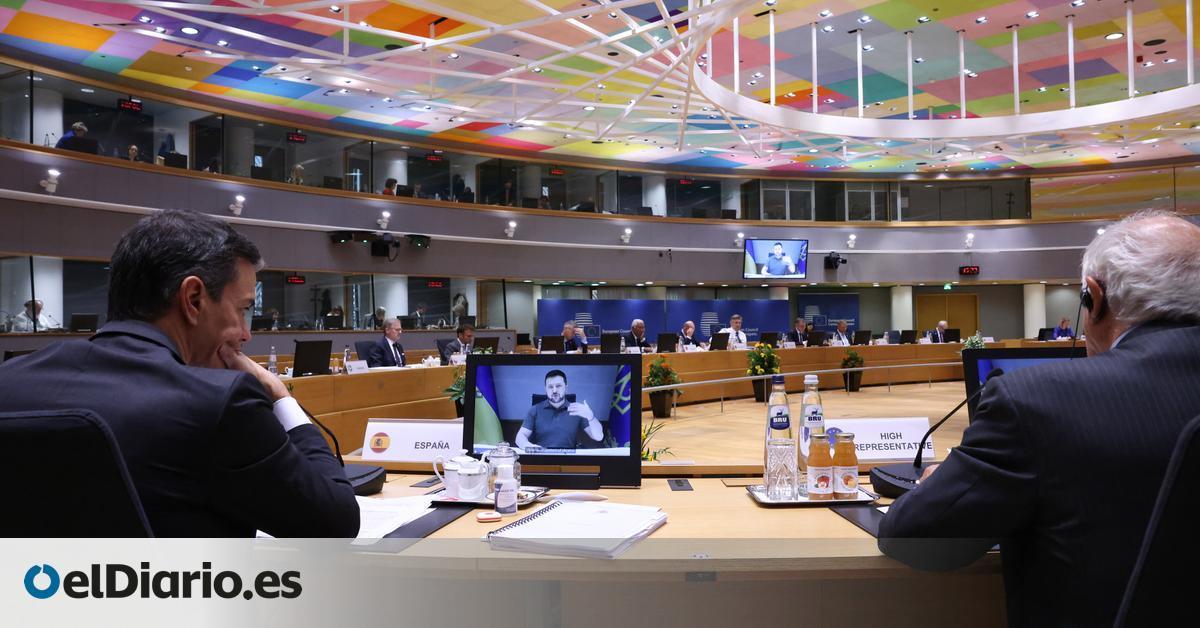
The leaders of the 27 call on Israel to allow “humanitarian corridors and pauses” in Gaza so that aid can reach the Palestinians. Now, beyond “deploring” the deaths of civilians, the EU avoids questioning Benjamin Netanyahu’s actions on the population of the Gaza Strip, where the death toll is close to 7,000. The agreement has arrived earlier than expected, but after hours of discussion about what first It seemed like a semantic debate.
“The European Council expresses its serious concern about the deteriorating humanitarian situation in Gaza and calls for continued, rapid, safe and unhindered access and humanitarian aid to reach all those in need of help through all necessary measures, including humanitarian corridors. and humanitarian pauses,” the 27 point out in the conclusions. In practice, they ask Israel to cease bombing at times to guarantee basic supplies to the civilian population, including fuel, the shortage of which is putting hospital care at risk.
The European Union will work closely with its partners in the region to protect civilians, provide assistance and facilitate access to food, water, healthcare, fuel and shelter, ensuring that terrorist organizations do not abuse such assistance,” it adds. the text.
In the last few hours there have been several drafts and the discussion revolved around the inclusion of the concept of a “humanitarian pause” or “humanitarian pauses” for aid to reach the Strip. This is an advance given that at the beginning of the week several countries were wary of this type of requests which, in the opinion of some of them, could mean a decrease in support for Israel’s self-defense after the Hamas attack on September 7. October.
The evolution has been the same as that of the United States, which vetoed a resolution calling for a “humanitarian pause,” but later proposed “humanitarian pauses.” “There has been an evolution in the North American position that has impacted the negotiations that have been held in the EU,” diplomatic sources acknowledge.
Sánchez has positioned himself in favor of the humanitarian pause under the premise that “the entry of humanitarian aid is allowed permanently and in a manner proportionate to the needs.” But countries like Germany, Italy or Austria did not see it favorably and opted for the second concept which, according to diplomatic sources, involves brief and specific breaks for aid to arrive.
Both several leaders before the meeting began and sources from several delegations subsequently have tried to downplay the semantic discussion. “The important thing is that the help arrives,” say sources from the Spanish Government.
“I hope we can call for a humanitarian ceasefire, a humanitarian pause; I’m not obsessed with the language we use. “What we want is for the violence to stop so that humanitarian aid can reach the civilian population in Palestine,” said the Irishman, Leo Varadkar, who, together with Sánchez, was the one who spoke of a humanitarian ceasefire that rejected the majority of capitals.
“A ceasefire means that Israel cannot defend itself, which is why it will not be in the text. But everyone agrees that humanitarian aid has to flow massively and that Israel has an obligation in this. Whether with a humanitarian pause or pauses, there will be an agreement,” said Dutch Prime Minister Mark Rutte before the debate.
“All the fantasies of a ceasefire and cessation of hostilities have led to the strengthening of Hamas,” said the Austrian Chancellor, Karl Nehammer, after the position of Sánchez and the Irishman reopened the semantic debate and pointed to “humanitarian windows.” .
“Israel is a democracy attacked by Hamas, a terrorist organization, it has the right to defend itself within international law,” said the president of the European Commission, Ursula von der Leyen, who has assured that this position is not “incompatible” with the humanitarian aid to Gaza. Thus, she has assured that two new EU planes will arrive this Friday with the extraordinary assistance that has increased from 25 to 75 million.
The president of the European Council, Charles Michel, has gone a step further than the leaders in recognizing that a “total siege is not in accordance with international law.” “There is a deterioration in the situation,” said the Belgian, who assured that that is why they are asking for “access” to humanitarian aid.
A peace conference without deadlines
The 27 have also downgraded the allusion to attacks on the civilian population. The draft condemned “in the strongest terms all violence and hostilities against all civilians”; but the final text is limited to “reiterate the importance of ensuring protection for all civilians at all times in line with humanitarian law.” “Deplores the loss of all lives,” says the EU.
The conclusions include an allusion to a peace conference, which is the driving idea that Pedro Sánchez conveyed upon his arrival in Brussels, although he avoids setting a time limit and limits it to being “soon.” The Spanish president had proposed it within six months.
“The EU is prepared to revive a political process on the basis of the two-state solution,” that paragraph states before “welcoming diplomatic peace and security initiatives” and supporting “the holding of a peace conference soon.” ”.
Source: www.eldiario.es

